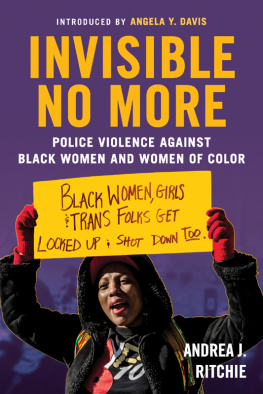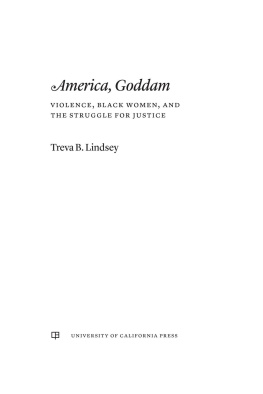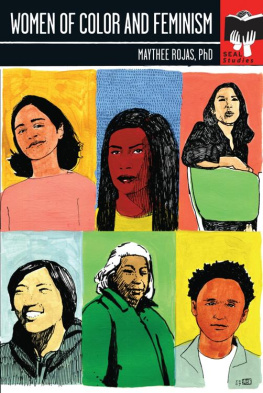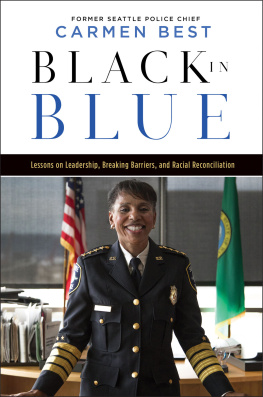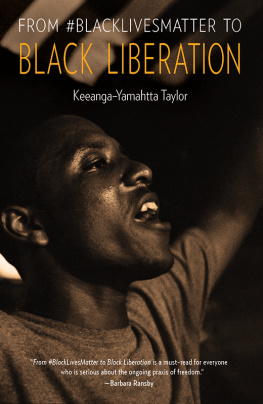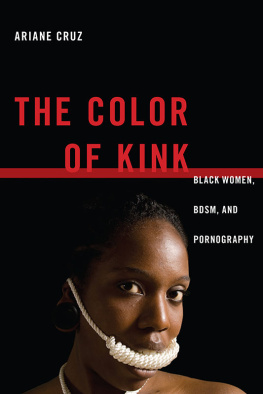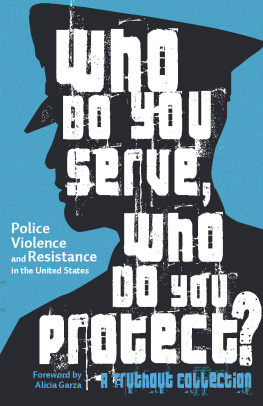
PRAISE FOR INVISIBLE NO MORE
Invisible No More deserves a standing ovation. Its a passionate, incisive critique of the many ways in which women and girls of color are systematically erased or marginalized in discussions of police violence. The stories told here will haunt, inspire, and challenge you to reimagine justice by moving the experience of Black women and girls from the margins to the center.
Michelle Alexander, author of The New Jim Crow
Invisible No More is a necessary intervention in the literature on policing. Ritchie moved me from page one with layered, thoughtful, and well-researched storytelling describing the multiple ways women of color are impacted by criminalization, begging the question of how their stories have been neglected and calling on all of us to make them visible. The insights revealed by these experiences, if heeded, will undoubtedly transform the course of history.
Opal Tometi, cofounder of Black Lives Matter and executive director of Black Alliance for Just Immigration
With a profound sense of urgency and deep compassion, combining her keen instincts as a legal scholar and her work as an antiviolence activist, Andrea Ritchie brings long overdue attention to the policing of Black women and other women of color such that their stories are indeed invisible no more. All of us must recalibrate our activist responses to the pernicious state violence used to maintain structural racism, heteropatriarchy, transphobia, class oppression, and other manifestations of injustice in ways that reflect our now deepened understanding of how police violence affects Black women and women of color.
Beth E. Richie, author of Arrested Justice: Black Women, Violence, and Americas Prison Nation
Invisible No More is a pathbreaking, timely, and powerful expos of police violence against Black women and women of color written by a leading advocate for race, gender, and queer justice. Andrea Ritchie not only explains with clarity why this policing constitutes systemic and structural violence that is at once racialized and gendered but also shows that resisting it requires centering the experiences of marginalized women. Essential reading for everyone committed to working for a world free of state violence.
Dorothy Roberts, author of Killing the Black Body: Race, Reproduction, and the Meaning of Liberty
Invisible No More is the most recent book by the brilliant Black feminist legal scholar, writer, and activist Andrea Ritchie, in which she maps the brutal history of police violence against Black, Indigenous, and other women of color in what is now the United States, countering the erroneous notion that men are the only or primary victims of such violence. From settler-colonial atrocities and the school-to-prison pipeline to the experiences of transgender women, Ritchie confronts us with a set of realities too vivid to ignore. Invisible No More is a hard book to read, but it is a necessary read, combining cutting-edge analyses with stories, including the authors, that will anger, educate, and inspire you to act.
Barbara Ransby, historian, activist, author of Ella Baker and the Black Freedom Movement, and president of the National Womens Studies Association
This is a terrifying book, not only because it exposes the startling number of Black women whose lives were cut short by state-sanctioned violence or the fatal consequences of policing Black womens bodies. What is most disturbing is how little we know about these women and their stories. It is astounding how quickly women of color disappear when we memorialize the many thousands gone. But thanks to Andrea Ritchies thorough research and raw storytellingcapturing both the horrors and the resistancewe can finally begin to #sayhername and end the states war on women of color once and for all.
Robin D. G. Kelley, author of Freedom Dreams: The Black Radical Imagination
This long-awaited book from Andrea Ritchie, the leading expert on police violence against women of color, is well worth the wait. This book is quite simply stunning. Ritchies analysis deeply challenges both antipolicing and antiviolence movements to expand the scope of their work to address how policing operates through gender, race, disability, and colonialism. Offering a rich genealogy of police violence, Ritchie demonstrates that, both historically and today, gender violence is central to policing. Her attention to the myriad ways policing impacts Black women and women of color is brilliant. A crucial and paradigm-shifting book.
Andrea Smith, author of Conquest: Sexual Violence and American Indian Genocide
With Invisible No More, Andrea Ritchie has produced a work of great scope and depth, tightly documented and deeply moving. Ritchie spans multiple centuries, nations, issues, and identity lenses to lay bare the effects of violent policing on women of color. She authentically and skillfully centers Black women while seeding the ground for alliances among women of color, and she gives us a thorough consideration of the experiences of women with disabilities. Most importantly, she introduces us to a generation of fighters we can follow, support, and lift up.
Rinku Sen, executive director of Race Forward
Andrea Ritchies Invisible No More is a powerful affirmation of why our movement has to be rooted in exposing and advocating for Black women and girls who experience state brutality. We saw with cases such as those of Sandra Bland, Gynnya McMillen, Kayla Moore, and Joyce Curnell how mainstream media and policymakers ignore police brutality against Black women. Invisible No More is a powerful tool that analyzes our criminal justice systems practices and patterns that maintain this problem. Through her writing, Ritchie has created the opportunity to do more than amplify police violence against Black women and to enable Color of Change and other movement organizations to also identify the intervention points where we can make real change happen in order to create a just and safe society for all Black people, especially cis and trans women and girls.
Rashad Robinson, executive director of Color of Change
Andrea Ritchies work is a vital contribution to our understanding of policing and criminalization, exposing how women, trans, and gender-nonconforming people are targeted. Ritchies intersectional analysis exposes how policing operates off racialized-gendered structures that target people with disabilities, Black mothers, Indigenous women, and others made hypervisible and/or invisible by white gender norms. This is the tool we need in this exact moment, as grassroots resistance to police violence grows alongside an increasing emboldenment of racist law enforcement.
Dean Spade, author of Normal Life: Administrative Violence, Critical Trans Politics, and the Limits of Law
Invisible No More is more than a book about police accountability; it is an important read that interrogates policing practices at the intersections of race, gender, sexuality, and ability. By examining how culpability has been constructed to facilitate the dehumanization and criminalization of women and girls of color, Ritchie skillfully presents the transgenerational trauma produced by centuries of overt and covert state violence against cis and transgender women and girls of color in the United States.
Monique W. Morris, author of Pushout: The Criminalization of Black Girls in Schools
Invisible No More is not only a hard testament to the true nature of policing in the United States upon Black, Indigenous, and other women of color but also to our foremothers relentless resistance; to their gifts of truth, kinship, and radical love; and to their will to see us and our own freedom dreams come to fruition.
Next page
